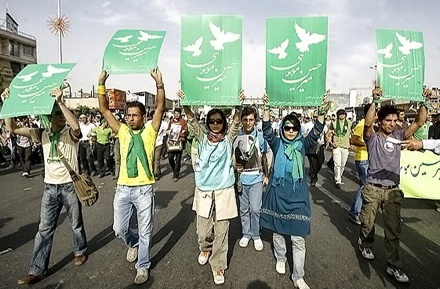
Every Saturday since last June, Farzaneh Zeinali met with a group of mothers at Laleh Park in Tehran.
The women dress entirely in black and silently make their way along pathways by candlelight. In their hands, they carry photos of their children – all political dissidents either killed or imprisoned in the aftermath of last year’s disputed presidential election.
This group is known as the Mourning Mothers of Iran. But, Zeinali doesn’t march with them anymore.
In January, she was one of 32 arrested by the Revolutionary Guard. While most of the others have since been released, it is believed Zeinali remains in the notorious Evin Prison – a place synonymous with years of torture and abuse.
This is just one example of the human rights abuse carried out by the government of President Mahmoud Ahmadinejad and the Revolutionary Guard. Iran has well-known history of jailing political dissidents, putting down protests with violence and enforcing oppressive laws through the religious police.
It should be pointed out occurs without the help of a nuclear bomb. Yet, it’s proliferation over human rights that produces countless rounds of diplomatic talks and tops meeting agendas at the United Nations.
There’s no doubt that Ahmadinejad’s nuclear ambitions are a concern across political spectrum. But, while treaties, sanctions (even military action) have been put forth as possible solutions, it’s what we’re overlooking that could be the greatest threat to Ahmadinejad’s regime – the years of human rights violations committed against his own people.
“Every time that [the Mourning Mothers] gather they are beaten up and attacked by the police,” said Shirin Ebadi, the 2003 Nobel Peace Prize winner and human rights activist in a speech at the Asia Society in New York. “Therefore if you want to see what lies ahead, what lies in the future of Iran, you can rest assured that it is the Mourning Mothers that will bring democracy to Iran.”
Since last June’s disputed presidential elections, mass protests have challenged the legitimacy of the Ahmadinejad regime. The Revolutionary Guard successfully blocked demonstrations planned on the 31st anniversary of the Revolution in February. Ayatollah Ali Khamenei even went as far as to mock the “futile efforts to subjugate” Iran.
But, futile may be an understatement.
The government had to flood Tehran with security forces and impose what U.S. President Barack Obama called a “near-total information blockade” in order to stop the demonstration. Still, Iranian dissidents continue their calls for democracy over the blogosphere and protestors keep the movement alive in the streets.
While Ahmadinejad does control Iran, his legitimacy is being challenged on a near-daily basis. By not putting the human rights violations at the forefront, we’re missing the opportunity to stabilize and secure the nation
This is not unlike Eastern Europe at the end of the Cold War. In 1984 Hungary, George Soros’ Open Society Institute injected millions of dollars into the democratic opposition and independent media. As these institutions grew, they in turn weakened the existing political structures.
Today though, the United States is looking to impose sanctions to curb Iran’s nuclear ambitions. But, as seen in North Korea, Iraq and even Iran itself, these measures rarely succeed in reversing hostile behavior.
What does consistently guarantee a more peaceful, stable world is the emergence of open, democratic nations with populations free from abuse by their governments.
This is exactly what growing numbers of Iranian citizens around the world are calling for. In doing so, they are weakening Ahmadinejad’s legitimacy.
By now shifting our focus to the current human rights abuses taking place in the streets of Tehran, we may just ease our proliferation concerns. In securing a more peaceful future for the people of Iran, we might just secure a more peaceful future for the world.
First Published in .
AUTHORS
Craig and Marc Kielburger are co-founders of Free The Children.






